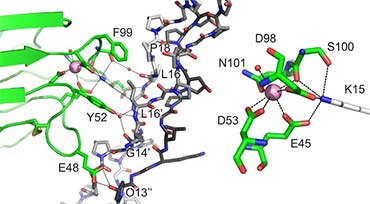People
Professor Russ Wallis
Professor of Molecular Immunology
School/Department: Respiratory Sciences, Department of
Telephone: +44 (0)759 221 8240
Email: rw73@leicester.ac.uk
Profile
I'm a biochemist interested in understanding the molecular changes that occur during initiation of the classical and lectin pathways of complement activation. These reaction cascades are directly responsible for neutralisation of pathogens and clearance of apoptotic cells. They also play key roles in stimulating and directing fundamental immunological processes including phagocytosis cell adhesion modulation of immune cell function and maintenance of immune tolerance as well as providing important bridges between innate and adaptive immunity. Specific interests include characterising the interactions between components that trigger complement activation establishing the molecular basis of immunodeficiencies caused by mutations in key complement proteins and understanding the complex regulatory mechanisms that prevent complement from destroying host cells.
Research
Specific research interests include characterising the interactions between components that trigger complement activation establishing the molecular basis of immunodeficiencies caused by mutations in key complement proteins and understanding the complex regulatory mechanisms that prevent complement from destroying host cells.
Structural biology of complement activation
Our research aims to understand how mammalian hosts defend themselves against pathogenic microorganisms, with a particular focus on a reaction cascade called complement. Complement activates as soon as a pathogen enters the body and serves to neutralise the threat via lysis or opsonisation (where the pathogen is tagged for destruction by host phagocytic cells) and prepare the body against further assault by stimulating and directing inflammatory and adaptive immune responses. Defective complement activation is associated with a wide range of diseases including immunodeficiences, inflammatory disorders (e.g. lupus erythematosus and rheumatoid arthritis), transplant rejection, and ischaemic diseases e.g. of the heart, kidney and brain.

Molecular representation of the interface between mannan-binding lectin and MASP-1.
Our research is focused on understanding four main aspects of complement activation at the molecular level: how complement components are able to distinguish between self and non- or altered-self structures; how binding to these structures initiates complement activation; how complement regulators control activation and prevent damage to host tissues and how mutations to complement components lead to disease. Our strategy is to characterise the protein-protein and protein carbohydrate interactions of complement using structural biology (X-ray crystallography, SAXS and EM) and biophysical methods (e.g. ITC, surface plasmon resonance, analytical ultracentrifugation and fluorescence). Our work is carried out in collaboration with Professors Peter Moody (LISCB) and Wilhelm Schwaeble, Department of Respiratory Sciences.
In addition to our work on complement activation, we are also interested in other host-pathogen interactions associated with disease, including the mechanism of action of the pore forming toxin, pnemolysin, of Streptococcus pneumoniae, with Professor Peter Andrew (Respiratory Sciences) and Dr Andrew Hudson (LISCB) and enzymes and signalling pathways of Mycobacterium tuberculosis and Gram +ve bacteria, with Drs Helen O’Hare, Galina Mukamolova, Ed Galyov and Hasan Yesilkaya (Respiratory Sciences).
Publications
Bhattacharyya N, Nkumama IN, Newland-Smith Z, Lin LY, Yin W, Cullen RE, Griffiths JS, Jarvis AR, Price MJ, Chong PY, Wallis R, O'Hare HM (2018) An Aspartate-Specific Solute-Binding Protein Regulates Protein Kinase G Activity To Control Glutamate Metabolism in Mycobacteria. MBio: 9:e00931-18
Almitairi OM , Venkatraman Girija U, Furze CM, Simpson-Gray X, Badakshi F, Marshall JE, Schwaeble WJ, Mitchell DA, Moody PCE & Wallis R (2018) Structure of the C1r-C1s interaction of the C1 complex of complement activation. Proc. Natl. Acad. Sci. (USA). in press DOI:10.1073/pnas.1718709115
Venkatraman Girija, U, Furze, C.M. Gingras, A.R., Yoshizaki, T., Ohtani, K., Marshall, J.E., Wallis, A.K., Schwaeble, W.J., El-Mezgueldi, M., Mitchell, D.A., Moody, P.C.E., Wakamiya, N. and Wallis, R. (2015) Molecular basis of sugar recognition by collectin-K1 and the effects of mutations associated with 3MC syndrome. BMC Biology; 13:27
Supervision
Molecular Immunology Protein structure/function Protein Biochemistry
Teaching
- BS2093
- MB3001
Press and media
Molecular Immunology Protein structure/function Protein Biochemistry